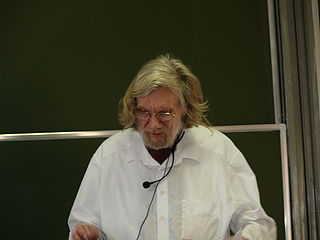Related Research Articles
In mathematics, the continuum hypothesis is a hypothesis about the possible sizes of infinite sets. It states:
There is no set whose cardinality is strictly between that of the integers and the real numbers.
In mathematical logic, the compactness theorem states that a set of first-order sentences has a model if and only if every finite subset of it has a model. This theorem is an important tool in model theory, as it provides a useful method for constructing models of any set of sentences that is finitely consistent.
In mathematics, a cardinal number κ is called huge if there exists an elementary embedding j : V → M from V into a transitive inner model M with critical point κ and
In the mathematical field of set theory, a large cardinal property is a certain kind of property of transfinite cardinal numbers. Cardinals with such properties are, as the name suggests, generally very "large". The proposition that such cardinals exist cannot be proved in the most common axiomatization of set theory, namely ZFC, and such propositions can be viewed as ways of measuring how "much", beyond ZFC, one needs to assume to be able to prove certain desired results. In other words, they can be seen, in Dana Scott's phrase, as quantifying the fact "that if you want more you have to assume more".
In mathematics, a Borel equivalence relation on a Polish space X is an equivalence relation on X that is a Borel subset of X × X.

Alexander Sotirios Kechris is a set theorist and logician at the California Institute of Technology.
Determinacy is a subfield of set theory, a branch of mathematics, that examines the conditions under which one or the other player of a game has a winning strategy, and the consequences of the existence of such strategies. Alternatively and similarly, "determinacy" is the property of a game whereby such a strategy exists.

Ronald Björn Jensen is an American mathematician who lives in Germany, primarily known for his work in mathematical logic and set theory.
Penelope Maddy is an American philosopher. Maddy is a UCI Distinguished Professor of Logic and Philosophy of Science and of Mathematics at the University of California, Irvine. She is well known for her influential work in the philosophy of mathematics, where she has worked on mathematical realism and mathematical naturalism.
In descriptive set theory, within mathematics, Wadge degrees are levels of complexity for sets of reals. Sets are compared by continuous reductions. The Wadge hierarchy is the structure of Wadge degrees. These concepts are named after William W. Wadge.

Burton Spencer Dreben was an American philosopher specializing in mathematical logic. A Harvard graduate who taught at his alma mater for most of his career, he published little but was a teacher and a critic of the work of his colleagues.
In the mathematical field of set theory, the proper forcing axiom (PFA) is a significant strengthening of Martin's axiom, where forcings with the countable chain condition (ccc) are replaced by proper forcings.
The Vaught conjecture is a conjecture in the mathematical field of model theory originally proposed by Robert Lawson Vaught in 1961. It states that the number of countable models of a first-order complete theory in a countable language is finite or ℵ0 or 2ℵ0. Morley showed that the number of countable models is finite or ℵ0 or ℵ1 or 2ℵ0, which solves the conjecture except for the case of ℵ1 models when the continuum hypothesis fails. For this remaining case, Robin Knight has announced a counterexample to the Vaught conjecture and the topological Vaught conjecture. As of 2021, the counterexample has not been verified.
In the mathematical discipline of descriptive set theory, a scale is a certain kind of object defined on a set of points in some Polish space. Scales were originally isolated as a concept in the theory of uniformization, but have found wide applicability in descriptive set theory, with applications such as establishing bounds on the possible lengths of wellorderings of a given complexity, and showing that there are largest countable sets of certain complexities.

Stevo Todorčević, is a Yugoslavian mathematician specializing in mathematical logic and set theory. He holds a Canada Research Chair in mathematics at the University of Toronto, and a director of research position at the Centre national de la recherche scientifique in Paris.

Benedikt Löwe is a German mathematician and logician working at the universities of Amsterdam, Hamburg, and Cambridge. He is known for his work on mathematical logic and the foundations of mathematics, as well as for initiating the interdisciplinary conference series Foundations of the Formal Sciences and Computability in Europe.
A mathematical theory is a mathematical model of a branch of mathematics that is based on a set of axioms. It can also simultaneously be a body of knowledge, and so in this sense can refer to an area of mathematical research within the established framework.
The Moschovakis coding lemma is a lemma from descriptive set theory involving sets of real numbers under the axiom of determinacy. The lemma was developed and named after the mathematician Yiannis N. Moschovakis.
The Gödel Lecture is an honor in mathematical logic given by the Association for Symbolic Logic, associated with an annual lecture at the association's general meeting. The award is named after Kurt Gödel and has been given annually since 1990.
References
- Maddy, Penelope (1988a). "Believing the Axioms I" (PDF). The Journal of Symbolic Logic . 53 (2): 481–511. doi:10.1017/s0022481200028425.
- Maddy, Penelope (1988b). "Believing the Axioms II" (PDF). The Journal of Symbolic Logic. 53 (3): 736–764. doi:10.2307/2274569.